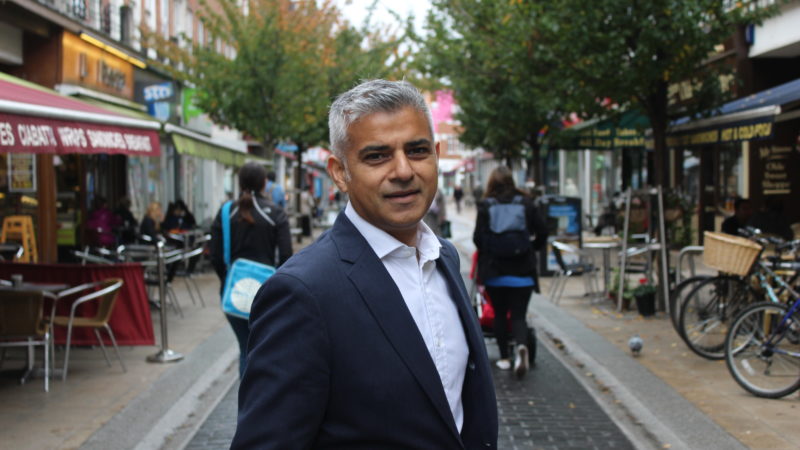
Labour incumbent Sadiq Khan has been re-elected in the London mayoral contest that turned out to be significantly closer than polls had predicted.
The victor secured 1,013,721 first preferences, a share of 39.8%, while Tory candidate Shaun Bailey ranked second as 893,051 residents, 35.1%, backed him as their first choice. As neither secured 50%, it went to a second round of counting.
The Labour candidate won on the second round of counting with 1,206,043 votes, a share of 55.2%, this evening. His Conservative challenger secured 977,601 once second preferences had been accounted for, or 44.8%.
Making his acceptance speech, Khan told those watching that he was “proud to have won an overwhelming mandate” and that London could only defeat Covid by “working together” to build a “bigger and brighter future”.
“The results of the election around the UK show that our country, and even our city, remain deeply divided. The scars of Brexit are yet to heal. A crude culture war is pushing us further apart,” Khan said.
He insisted that “we simply must use this moment of national recovery to heal those damaging divisions” and argued: “There is more that unites us than divides us.”
“I’m a Londoner, through and through. This city is in my blood. But I’m also a patriotic Englishman and a Brit, who’s proud to represent this nation’s great capital,” the newly elected London mayor said.
“This virus does not care whether you live in London or Liverpool, whether you’re a Brexiteer or a Remainer, or what you think it means to be woke. We’re only defeating it by acting together and helping each other.”
Khan achieved the most votes in the constituencies of North East, Barnet and Camden, Greenwich and Lewisham, Merton and Wandsworth, Enfield and Haringey, City and East and Lambeth and Southwark.
Bailey got the most votes in the constituencies of West Central, Havering and Redbridge, Ealing and Hillingdon, Bexley and Bromley, Brent and Harrow, Croydon and Sutton and the South West.
Opinium polling last month had suggested that the Labour incumbent could win the mayoral race in the first round with 51% of first preference votes. Similarly, Redfield & Wilton predicted in April that Khan would win 47%.
But surveys this week suggested that the contest was narrowing, with Khan predicted to secure 43% of first preferences by YouGov and 41% by Savanta Comres. Bailey was forecast to achieve 31% and 29% respectively.
Labour warned on Wednesday of a “considerably worse night” than predicted. Khan said: “Please do not think this is in the bag. I’d urge all Labour members to get involved with their local party tomorrow and help us get out the vote.”
Turnout was down on the last vote. 42.2% of residents in the capital posted their vote in or made the trip to the polling station on Thursday, down from 45.3% in the 2016 race. Concerns had been raised about turnout due to the pandemic.
Opinium research showed that 32% of Londoners were worried about going to vote. Younger voters were more likely to be deterred, with 45% of those aged 18-34 reporting they are worried, compared to 29% of those aged between 35 and 54.
The result declared this evening saw Khan’s share of first preferences fall from 44.2% in the last election, and a second round vote share of 56.8%, when he ran against Zac Goldsmith in the 2016 London mayoral contest.
Labour’s win in London follows news of the party losing Hartlepool, being heavily defeated in the Tees Valley mayoral race and losing control of councils in England, including Harlow, Nuneaton and Sheffield.
The party has been successful in winning the Doncaster and Liverpool City mayoral races, the Liverpool City Region metro mayor, the Greater Manchester mayor, West of England mayor and Cambridgeshire and Peterborough mayor.
Welsh Labour outperformed expectations by securing 30 seats in the Senedd, a working majority, under the leadership of Mark Drakeford. Scottish Labour has so far held onto 22 seats in Holyrood, a reduction of two.
Keir Starmer said on Friday that Labour has “changed” but must “go further”. He denied that the party is facing an existential crisis yet also said that the issue “goes way beyond a reshuffle or personalities”.
Deputy leader Angela Rayner was sacked as Labour Party chair and national campaign coordinator on Saturday evening in a bold move by the Labour leader in response to the poor local election results across England.


More from LabourList
‘How Labour could win a Milton Keynes majority for the first time in decades’
Exclusive: Poll shows Starmer more trusted than PM on Middle East crisis
Revealed: Poll shows 1 in 4 Tory voters says Rayner faces ‘smear campaign’